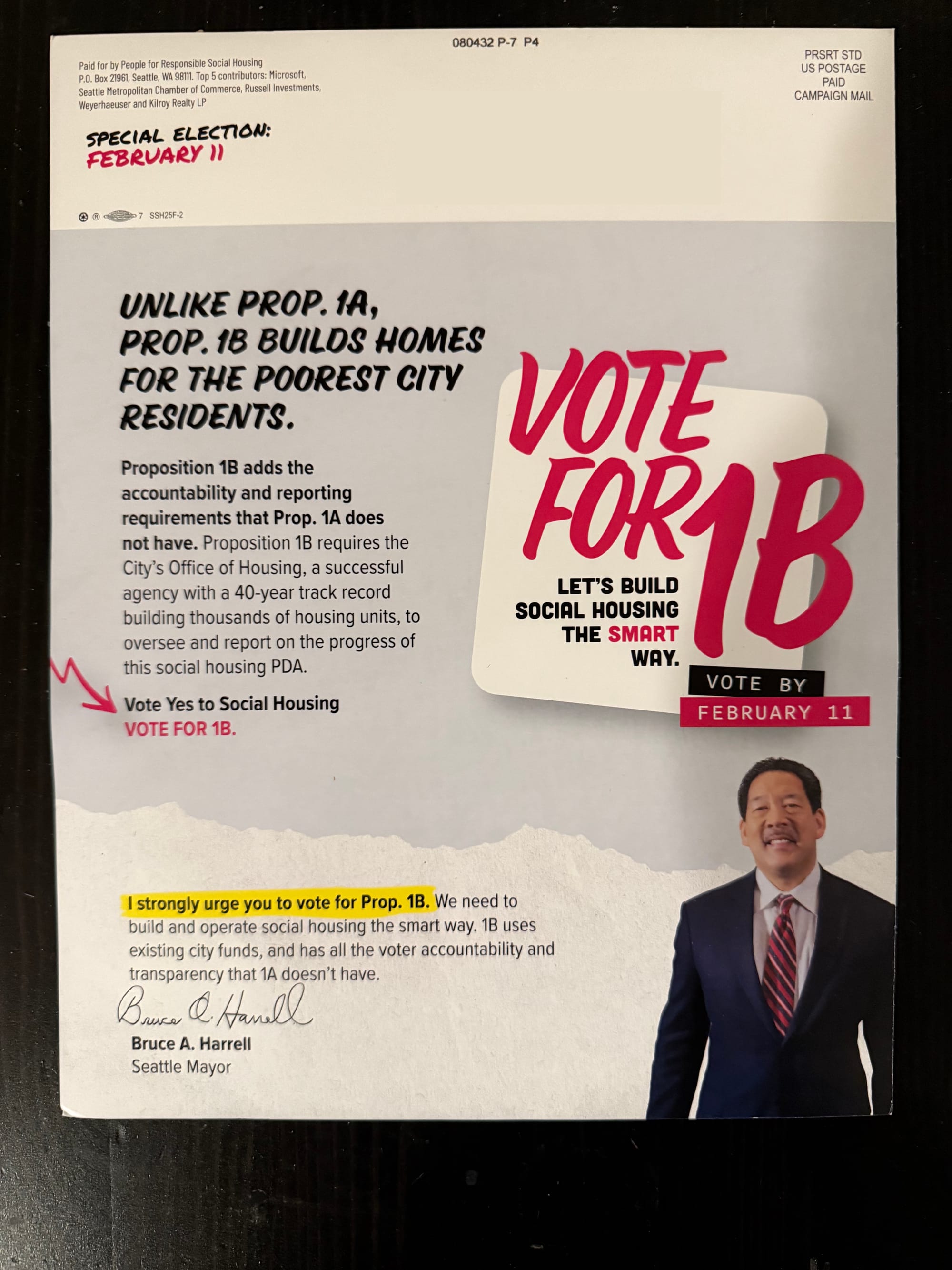Katie Wilson Isn't Winning Because of Trump
In the mayoral race this year between Katie Wilson and incumbent Mayor Bruce Harrell a narrative has developed, particularly in local media, that Wilson is ahead in the race because of Trump. Blaming Harrell's poor primary performance, losing 41% - 51% to Wilson, on voters reacting to the Trump administration is a cop-out answer to the poor performance of both Harrell and the other incumbents losing in Seattle. I think it's important to call out this lazy reasoning as I don't think the incumbents should get to throw their hands up and say "it's not my fault I lost, it's because of Trump!". The reason they are losing, in my view, is that they did a poor job of addressing the local concerns of Seattle voters starting in early 2024 with one of the top concerns being affordability.
Who's Blaming Trump?
After the August 5th primary this year a Trump narrative for poor incumbent mayoral performance quickly arose.
- Seattle Nice - August 7th: "I do think Trump's re-election in November of last year completely changed the psychological complexion of the electorate in Seattle"
- The Seattle Times - Seattle mayoral race explained: Why Harrell is behind and what happens next - August 7th: "'Prior to Trump taking office, the assumption was the mayor was sailing to reelection, and now he’s in a fight for his political life,' he said. Trump’s return may have spurred Seattle voters to return to their more progressive roots after dabbling in a slightly more conservative City Hall for the past four years, Kaushik said. More than that, though, Trump has spurred a broader backlash."
- The Seattle Times - Seattle mayor’s chief of staff resigns - August 13th: "As for Harrell’s poor showing in the primary, Racca said he viewed it as part of a larger backlash against incumbents, rooted in people’s impatience to take out their anger on the Trump administration."
- The Seattle Times - Primary election shows we just can’t quit ideological drama: "To shorthand the primary results: Voters wanted to strike a blow against Trump. They rejected incrementalism and narrow thinking. They wanted something big. They wanted something different."
- A direct quote from incumbent city-wide councilmember Sara Nelson "I’ve been told I need to bump up my sort of anti-Trump rhetoric, or acknowledge that we’re under attack, or whatever".
The reason I wrote this piece is because The Seattle Times just posted another piece arguing that Trump is the reason why Seattle incumbents are losing.
I have followed these public servants closely since they took office in 2022. I don’t always agree with them. I’ve watched their missteps, miscues, miscommunications. I’ve also seen them take voter concerns about public safety and civic discord and actually do something.
By and large, Harrell, Nelson and Davison met the moment.
Do they deserve to be one-termers?
If the Seattle electorate is angry at Trump, does it make sense to take it out on City Hall? If voters are angry that not enough progress has been made on local issues for the tax money invested, are they sure the challengers could do any better?
If we had nothing else to go on I think that would be a fair explanation for the primary results but there's other data points that we can use to get a clearer picture.
What do the people say?
The Northwest Progressive Institute does regular surveys of Seattle voters about their feelings on Seattle electeds. The full trend is visualized below.
| Month | Total Approve | Total disapprove | Not sure |
|---|---|---|---|
| January 2023 | 61% | 26% | 14% |
| April 2024 | 43% | 41% | 16% |
| October 2024 | 40% | 45% | 15% |
| January 2025 | 38% | 48% | 15% |
| May 2025 | 37% | 45% | 18% |
| July 2025 | 40% | 46% | 14% |
| October 2025 | 36% | 52% | 12% |
Mayor Harrell started the second year of his mayorship with a large approval rating which dropped to nearly even and then to negative in his third year. His approval rating dropped before the 2024 presidential election results. If Harrell's approval dropped before Trump was re-elected then I don't think it makes sense to call Trump out as a major reason Harrell lost the 2025 primary. I think the major reason is affordability becoming an even greater concern for voters in Seattle.
The people care about affordability
The Seattle Metro Chamber publishes a survey, called The Index, twice a year that asks voters in Seattle how they feel about the city. One of the questions they ask every year is "What are the issues facing Seattle that you are most frustrated or concerned about?". Before Spring 2024 the top concerns of "homelessness" and "crime/drugs/public safety" were a much higher concern to voters compared to the third item of "cost of living/affordable housing", a 29 point difference between the two in Fall 2023. However, in the Spring 2024 report affordability jumped 7 points and only continued to increase in importance. Meanwhile the other two issues dropped in importance.

In the latest Chamber survey from October affordability and public safety tied in importance at 30%. Tied!
Now I think it's incredibly important to stop here and point out that homelessness and public safety concerns are the reason why Harrell won in 2021 in the first place. The current incumbent challengers back then didn't align with Seattle voters on how they wanted their elected officials to address their top concerns. It's also important to recognize that the current incumbents arguably solved voters concerns on these issues. I say arguably because there are definitely multiple factors at play and that discussion is outside the scope of this piece.
The Spring 2024 jump in affordability concerns aligns with the April 2024 drop in Mayor Harrell's approval ratings. Voters started to care more about affordability and Mayor Harrell didn't start to prioritize those concerns. Katie Wilson capitalized on this point when she decided to enter the mayoral race.
Wilson said that she specifically decided to enter the race after Seattle Proposition 1A passed in February. Mayor Harrell supported 1B and even had his picture on one of their mailers.

Prop 1B didn't just lose, it was heavily defeated 63% - 37%. It was a sign that Mayor Harrell was out of step with Seattle voters.
There are other data points that I could get into about affordability in Seattle like the fact that Seattle's median household income was $115,000 in 2022 and $121,000 in 2023. Or I could go into how Seattle's median rental price and median home purchase price has kept increasing while the percentage of Seattle residents that rent has also increased to 56%. Harrell's message to voters about affordability before the primary was nonexistent and his message after has not been resonating with voters.
I believe Mayor Harrell will become another one term mayor officially in November. He helped the city recover from the pandemic era and gets credit for that but didn't meet the affordability moment. Wilson on the other hand, early on in her campaign, talked about affordability. She released a video explaining the reasons why a slice of pizza in Seattle cost $8. She knew exactly where voters were at. Seattle moderates[1] lost because of affordability not because of Trump.
Compared to national politics pretty much all Seattle elected officials are progressives but that's not descriptive enough to distinguish politicians in Seattle so my preferred terms are "Seattle progressive" and "Seattle moderate". ↩︎
